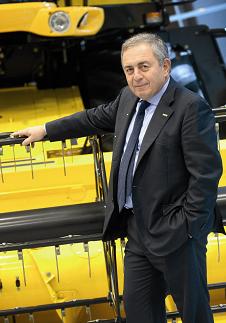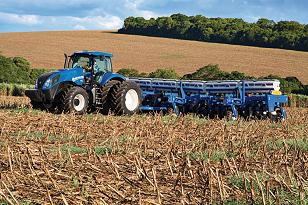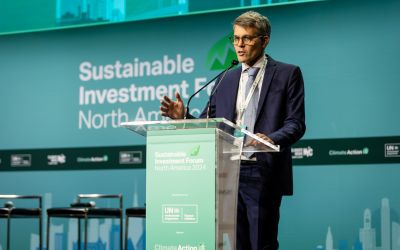New Holland’s low-carbon solutions in the agriculture industry
Franco Fusignani, Brand President at New Holland Agriculture, discusses technological innovations, energy efficiency and the use of renewable energy in the agriculture industry.

New Holland is improving efficiency and productivity in the agriculture industry and launched the Clean Energy Leader strategy in 2006 for the active promotion of renewable fuels, emissions reduction systems and sustainable agricultural technology.
Climate Action interviewed Franco Fusignani, Brand President at New Holland Agriculture, to find out more.
You have been involved in sustainable solutions in agriculture for nearly three decades, what was your inspiration for becoming involved with the industry? And how have you seen the industry change in that time?
At New Holland the inspiration has been not only meeting farmer’s needs but to anticipate them by providing solutions that set a benchmark for the industry.
Agriculture has changed significantly in the last 50 years. The trend has been toward fewer, larger and more specialised production units. This was accompanied by vertical integration of production, processing and distribution functions, as well as increasing reliance on biological and information technologies. This evolution happened in order to produce more efficiently and address factors such as population growth, adverse weather conditions, drudgery, labour shortage and fluctuating prices of commodities.
At New Holland, we realised that to meet the different needs that this evolution was creating, we would have to make agriculture more efficient. We had to make it possible for fewer farmers to feed more people better at lower costs; and we did so, also with focus on small, traditional farmers who need simple and basic products. We have been doing this considering threats to the environment, threats to the natural resource base, and threats to the quality of life of farmers and their safety, of rural residents and society as a whole – which have risen with growing concerns for environmental pollution.
What does this mean for your business and agriculture today?
Today we are in the midst of a great transition that is shaping world economies and is leading them to rethink their approach to growth. We are shifting from an industrial to a sustainable oriented model.
The paradigm of sustainable agriculture has emerged to solve problems, primarily pollution of our environment and degradation of our natural resource base. However, this new paradigm seems capable of creating benefits such as longer economic viability in agriculture, greater individual creativity, dignity of work, and attention to issues of social equity.
At New Holland we had to change our way of thinking. Today, we don’t see the environment as a constraint to profitability; we see it as one of the most valuable assets to long-term economic viability in agriculture.
Sustainable systems must be site-specific, interdependent and dynamic. For such systems, size must follow function. The objectives are to specialise, mechanise, control the whole production process to make farms work like factories and fields and feedlots run like assembly lines. It means that each area and each crop requires the appropriate support in terms of technology, practices and competences.
And New Holland is at the forefront of research and innovation aimed at developing more sustainable and environmentally friendly agricultural practices. Our pioneering research in low emission technologies in collaboration with our sister powertrain company FPT Industrial is a case in point. Consider that a current New Holland machine, with an engine complying with the latest European regulations (Tier 4A) can work for 100 days producing the same emissions than a Tier 1 emission machine would have produced in a single day. As a result of our research, today we offer a range of equipment that cuts fuel consumption by up to 10% while reducing NOx emissions by over 90%.
New Holland has been a leader in providing products that improve farming efficiency and productivity for over 100 years. What do you feel have been the underlining reasons for this consistency and success?
I would summarise them in three words: resources, competence and forward thinking. New Holland has today the widest agricultural equipment range in the industry, an industrial and distribution network spread on all continents and our industrial group has the resources to invest in research & development and cutting edge technologies.
"The Energy Independent Farm will allow farmers to produce hydrogen, through renewable resources like wind, solar, biomass"
We have been producing and selling machinery for almost 120 years; today we operate in 170 countries through over 2,000 dealers and importers and run 25 factories in various parts of the world. We know the markets where we operate and we know we must adapt to local needs. We do so respecting the local culture, sending our specialists to the field and working close to the farmers to find the most efficient solutions for their needs.
In 2006 New Holland launched the Clean Energy Leader strategy for the active promotion of renewable fuels, emissions reduction systems and sustainable agricultural technology. How is the strategy progressing?
We started in 2006, when we were the first manufacturer to promote the use of bio-diesel in our machinery around the world. In 2009 we previewed our NH²™ Hydrogen powered tractor prototype and we presented the Energy Independent farm concept. The Energy Independent Farm will allow farmers to produce hydrogen, through renewable resources like wind, solar, biomass on their farm. This can then be used to power the NH2™ tractor, which emits virtually zero emissions, just a little water, or to supply electricity and heat to the farm buildings and its activities.
In September 2010, New Holland was the first company to introduce the Tier 4A compliant machines. At the same time we announced a clear “SCR (Selective Catalytic Reduction)” roadmap to meet Tier 4 Final regulations for our machines.
We have always been ahead of the game, and we never stop progressing. Today, New Holland offers the industry's widest range of Tier 4A compliant products: 33 tractors and 18 combine models.
When it comes to Tier 4A technology, New Holland can draw on the experience of our in-house powertrain company which, for example, invented the Common Rail technology in the 1980s and brought it to the masses in 1997.
FPT Industrial, as part of Fiat, has pioneered the SCR technology since 1995 and has already produced over 320,000 SCR engines during the last six years for the agricultural, construction and haulage industries. Today the SCR technology is powering more than 35,000 New Holland machines around the world.
As a result, today New Holland offers a range of Tier 4A SCR equipment that brings about a substantial cut in the carbon emissions.
We have also developed an on line Carbon Calculator tool that helps farmers in checking and monitoring the current carbon footprint of their equipment and which emissions reduction they can achieve by using New Holland Tier 4A SCR machines.
In recognition of the on-going commitment to more environmental friendly practices, in 2012 the Fiat Industrial Group was rated for the second consecutive year Sector Leader in the Dow Jones Sustainability Indexes in the field of industrial engineering and has been featured in the Carbon Disclosure Leadership Index (CDLI) with a score of 91/100 by the Carbon Disclosure Project for its commitment in reducing carbon emissions.
New Holland is recognised for its Research and Development; what innovations and initiatives are being developed currently?
As I mentioned, we are carrying on with research relating to the use of biofuels, fuel efficiency and low emissions technologies, hydrogen tractors – all of which address important customer needs. As part of our Clean Energy Strategy, we are also running other initiatives dedicated to specific areas. For example, we are developing sustainable solutions for the viticulture industry.
"We are developing sustainable solutions for the viticulture industry"
We are also working on a number of renewable fuels, alternative to diesel. We are focusing on solutions available in the short term, such as ethanol and methane, while working on longer term solutions such as our zero emission hydrogen engines.
Ours is a global approach, with local application. In Latin and North America and in India we are investing in research on second generation ethanol, while in Europe we are focused on methane.
New Holland is an important catalyst in the transition to a low-carbon, sustainable agriculture. How crucial do you feel the increased use of biomass is to this?
Undoubtedly it is crucial and touches the use and waste of resources. In countries such as Brazil and India, New Holland saw an opportunity to produce energy from what were previously considered to be waste products, namely straw from paddy fields, cotton, maize and oilseed rape, and reduce the negative environmental impact of large-scale ‘stubble burning’ in the process.
In Brazil for example, where there are over 12 million hectares of land given over to sugar cane production, New Holland is partnering with the Centro de Tecnologia Canavieira (Sugar Cane Technology Centre - CTC) providing a complete range of farming equipment to make the most from the use of biomass crops which means producing energy from sugar cane not just in the traditional form of ethanol, but also by transforming sugar cane straw into energy.
What are the key crop/food production issues globally and what solutions are being found for them?
Food production capacity is faced with ever-growing challenges, such as the expected growth of world population to nearly 9 billion by 2050 and a falling arable land to population ratio. Droughts and floods are increasing in frequency around the globe, and in the face of climate change, farmers face the challenge of using their resources more effectively as they play a key role in ensuring global food security.
"In the face of climate change, farmers face the challenge of using their resources more effectively as they play a key role in ensuring global food security"
The environmental impact of crop production is critical today, as is the potential for using modern technology to increase crop production efficiency and more importantly, to do it in a sustainable way.
Today there is on-going debate among farmers between organic vs. conventional farming, no-till vs. conventional tillage, and precision farming vs. traditional practices. There isn’t a one-size-fits-all solution. Farms are part of an ecosystem and the way they are run has potential social, economic and environmental impacts. There are merits to different solutions, according to the local situation. While studies suggest that organic farming uses significantly less energy than conventional, it won’t be the answer for everyone. Organic, no tillage and precision farming techniques address the issues of soil preservation and agricultural production in different ways. In general they reduce or eliminate the use of synthetic additives such as fertilizers, and may bring savings in fuel used in the whole agricultural cycle, in water use or seeds.
All these techniques are to be evaluated within the management of the biodiversity and ecosystem services as recent trends point out, and require the availability of specialised machinery and technological systems as well as an in-depth knowledge of agronomic practices that we are committed to provide at New Holland.
What best practice from agriculture have you developed in some areas that can be transferred into other regions and markets?
In 2013 we have incorporated Conservation Agriculture into our Clean Energy Leader strategy. Conservation Agricultureis practicing minimum mechanical soil disturbance, in order to maintain minerals within the soil, stop erosion, and prevent water loss from the soil. It is also about good residue management to enhance the soil’s health and productivity; crop diversification to reduce diseases; good management of inputs in order to increase their effectiveness, reduce over-application and improve profitability.
Conservation Agriculture is not a dream or a small exotic business. It is a reality and it is growing year after year around the world, at the rate of some 6 million hectares per year. We are seeing a significant growth in Brazil, Argentina but also in Canada and in the USA.
In Europe, Conservation Agriculture is just in the early stages, but we foresee a fast increase starting from 2014 when the Community Agricultural Policy reform will enter into force. Conservation Agriculture is a "win-win" situation for both farmers and the environment.
As Clean Energy Leader, let me give just a few examples of how our machinery supports Conservation Agriculture and new ways of farming. Our range of Precision Land Management features precision farming solutions for conservation agriculture, for example IntelliSteer guidance system, which is ideal for controlled traffic farming and IntelliRate section control to reduce overlaps and ensure precise spray application.
On tractors, New Holland offers power-to-weight ratios of up to 25.8 kg/hp on the T7 range, ensuring excellent traction and reduced soil compaction.
Our CR Combines are equipped with the Opti-Spread residue management system that ensures a consistent wide-spreading of residue, ideal for No-Tillage applications.
And talking about no-till applications, we cannot fail to mention our no-till drills product offering. In Brazil, a country where almost 80% of cereals are produced through direct seeding, we are actively marketing 10 different ranges of planters from small to large grain applications, and we are planning to introduce new seeding drills, specifically developed for European applications, crops and conditions.
Waste is fast becoming an increasingly relevant topic, with the US for example destroying more food per annum than the entire continent of Africa produces. Is this end of the ‘food chain’ one New Holland is actively targeting as well?
Resource management, cost control and waste reduction are key issues for every company such as ours. Because managing resources means respecting the environment, controlling costs means making food more accessible and reducing waste is synonymous with not throwing food away and of course wasting water.
These are, believe me, the real commitments to a company like ours.
For example, our precision farming techniques enable farmers to dramatically improve productivity, up to 40%, and while reducing the consumption of fertilizers by up to 50%.
In a broader perspective, in several countries around the world we are working with the local governments, providing comprehensive assistance in the development of large scale mechanisation projects, to help them develop their food self-sufficiency.
In Iraq we have refurbished a park of 10,000 tractors and a thousand of combine harvesters, enabling the country to start developing its own agricultural production.
"In Iraq we have refurbished a park of 10,000 tractors"
In China, where we have two factories and two more will be completed soon, over the past 10 years we have helped the Chinese government to shift from an agricultural model where 45% of the wheat is harvested by hand, to mechanised agriculture. What does this mean? Let me give an example. Harvesting 9 hectares of land a day means to harvest about 23 tonnes of grain. When harvesting by hand, at least 3.5 tonnes are left on the ground; this means you lose 15% of the crop. With a combine harvester, the waste is only 175 kg. This means saving in a day's work about 3 tonnes that can be devoted to food.
This is the harmonisation of agricultural innovation and flexibility that we introduce country by country to deploy the best systems in defense of food safety.
I think we have a role in helping farmers manage resources better, so they don’t waste natural resources such as water, land, seeds or fuel, and develop and optimise all growing cycles. This means for New Holland expanding its commitment, developing and embracing new technologies, diversifying practices to put them at disposal of our customers in the light of an efficient, profitable and sustainable development.


.JPG)
.JPG)






